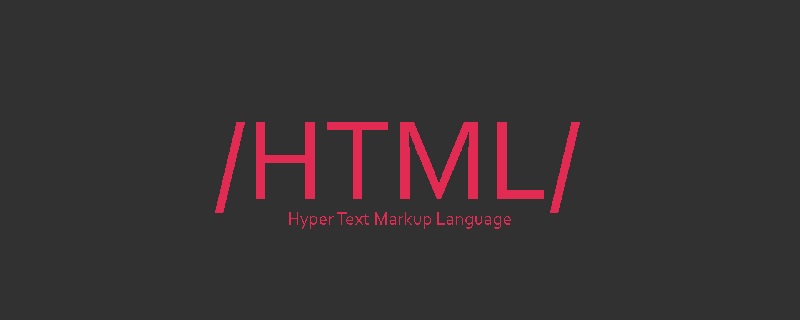
htmlThe official name is Hyper Text Markup Language. HTML is the description language of WWW and a markup language; it includes a series of tags through which the document format on the network can be unified and scattered Internet resources can be connected into a logical whole. Each HTML document is a static web page file. This file contains HTML instruction codes. These instruction codes are just a markup structure language that layouts the display position of data in the web page.

The operating environment of this tutorial: Windows 7 system, HTML5 version, Dell G3 computer.
What is HTML?
The full English name of HTML is Hyper Text Markup Language, which is a markup language. It includes a series of tags. These tags can unify the document format on the network and connect scattered Internet resources into a logical whole. HTML text is descriptive text composed of HTML commands. HTML commands can describe text, graphics, animations, sounds, tables, links, etc.
<!DOCTYPE html>
<html>
<head>
<meta charset="utf-8">
<title>网页标题</title>
</head>
<body>
...正文内容,用于放置网页中的所有内容,如文字、图片、链接、表格、表单等。
</body>
</html>HTML tags are basically keywords (tag names), enclosed in angle brackets, and usually appear in pairs.
The opening tag (
The closing tag (>) is used to close HTML elements to distinguish individual elements.
Since 1990, HTML has been used as the information representation language of the World Wide Web. Files described using HTML need to be displayed through a web browser. Effect. HTML is a language for creating web page files. It uses markup instructions (tags) to display images, sounds, pictures, text animations, movies and other content.
In fact, every HTML document is a static web page file. This file contains HTML instruction codes. These instruction codes are not a programming language, but a typesetting position for displaying information on a web page. Markup structure language, easy to learn and understand, very simple.
The universal application of HTML is the technology that brought about hypertext - jumping from one topic to another, jumping from one page to another, and linking to files on hosts around the world with a click of the mouse. The Hypertext Transfer Protocol specifies the rules and operations that browsers follow when running HTML documents. The formulation of HTTP enables browsers to have unified rules and standards when running hypertext.
Main features of HTML:
Simplicity: Hypertext Markup Language version upgrade adopts superset method, making it more flexible and convenient.
Scalability: The wide application of hypertext markup language has brought about requirements for enhanced functions and added identifiers. Hypertext markup language adopts the method of subclass elements to bring system expansion. to guarantee.
Platform independence: Although personal computers are popular, there are many people who use other machines such as MAC. Hypertext Markup Language can be used on a wide range of platforms. This is also the World Wide Web (WWW) Another reason for its popularity.
Versatility: In addition, HTML is the universal language of the Internet, a simple and universal all-purpose markup language. It allows web page producers to create complex pages that combine text and images, and these pages can be viewed by anyone else on the Internet, regardless of the type of computer or browser used.
Extended knowledge:
A hypermedia document on the World Wide Web (www) is called a page (foreign language: page). The page that is the starting point for an organization or individual on the World Wide Web is called the homepage (foreign language: Homepage) or homepage. The homepage usually includes pointers (hyperlinks) to other related pages or other nodes. The so-called hyperlink is a Uniform Resource Locator (Uniform Resource Locator, foreign language abbreviation: URL) pointer, by activating (clicking) it, the browser can easily obtain new web pages.
This is also one of the most important reasons why HTML is widely used. An organic collection of pages that is logically viewed as a whole is called a website (Website or Site). Hypertext Markup Language (English abbreviation: HTML) is a markup language designed for "web page creation and other information that can be viewed in a web browser."
The essence of a web page is hypertext markup language. By combining the use of other Web technologies (such as scripting languages, public gateway interfaces, components, etc.), powerful web pages can be created. Therefore, Hypertext Markup Language is the basis of World Wide Web (Web) programming, which means that the World Wide Web is built on hypertext. Hypertext Markup Language is called Hypertext Markup Language because the text contains so-called "hyperlink" points.
Related recommendations: "html video tutorial"
The above is the detailed content of What is the official name of html. For more information, please follow other related articles on the PHP Chinese website!